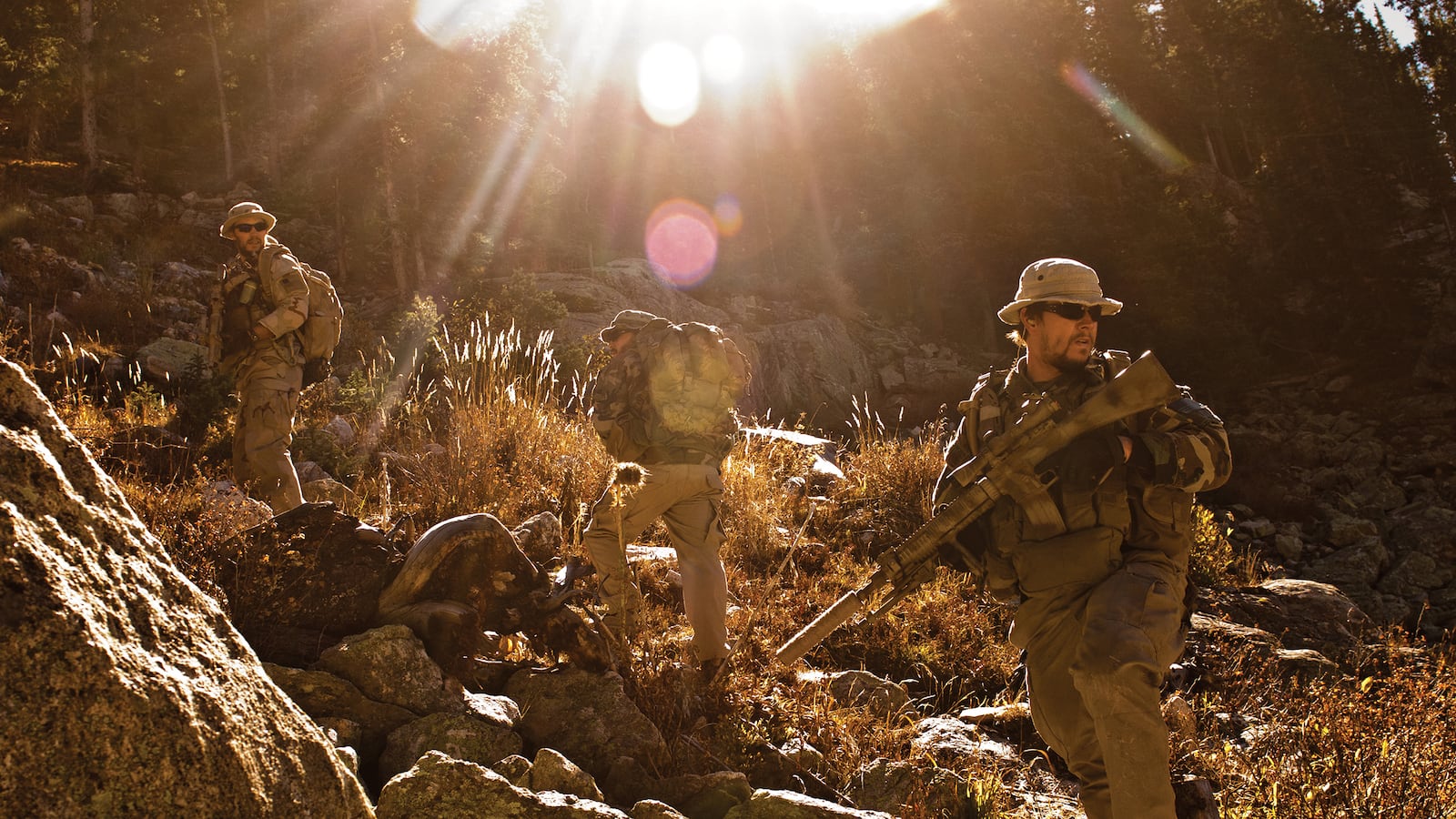Spoiler Alert. Lone Survivor is a movie.

Lone Survivor is a film with a serious identity crisis. It is a biopic and a memorial, both ultimately cheapened by concessions to the action genre and an inability to fully humanize its characters. It depicts Operation Red Wings where, for their part, a four man SEAL team is tasked with locating and surveilling an enemy militia leader from a mountain in Afghanistan. Mark Wahlberg plays real life Marcus Luttrell, who we know to be the only survivor, and we follow him and the doomed members of his team through their ordeal. Though based on Luttrell’s bestselling memoir of same name, be prepared to see a Hollywood movie instead.
Opening with powerful documentary footage of SEAL training, it then hurries through the template required for lead character introductions in order to get us into the fight. This is where the trouble begins. Their mission soon explodes into an operation gone terribly wrong but we have not yet been able to really bond with our heroes.
Filmed in the Sangre de Cristo Mountains of New Mexico, the sweeping vistas establishing the arid Afghan landscape are actually images from our own American frontier and Luttrell’s story has all the elements of a Western. His team’s surveillance position is quickly compromised by unarmed goatherds and the team debates the benefits of killing them to protect themselves or freeing them out of moral or military obligation and suffering the consequences. They choose the latter, are betrayed for their mercy and their attempted escape from Afghan guerrillas is a violent series of ever worsening scenarios. Berg captures the SEAL team’s torturous descent down the rock slopes with gripping intensity, perfect sound effects and tight editing. It is ruthless injury porn, the wounds gathering on the men and their ammunition running out. Berg even went so far as to study the autopsy reports of the dead team members recovered from the site and he replicates fanatical detail in uniforms and procedures with close oversight from SEAL advisors. All this work serves to paint the actors and the action as very mechanically convincing. It is “realistic” combat imagery born of the Black Hawk Down Zeitgeist and it is effective. Such obsession with accuracy makes what Berg does with creative license for the rest of the story so self-contradictory. During the 40 or so minutes of the ensuing shootout, at least 31 guerrilla fighters (more than were even present in all the original after-action estimates) are killed in a repetitive video game fashion, each one thrown down by accurate bullets from the SEAL team with such speed that we barely see the faces of our enemies. These could have been segments from games like Call Of Duty or Medal of Honor played with equal detachment by teens and this may have been the demographic Berg sacrificed honesty to please.
The Team’s leader, Mike Murphy (Taylor Kitsch) is shot three times through the back after a selfless attempt to call for help and he kneels to die slowly as Danny Deitz (Emile Hirsch) quietly passes away elsewhere. Matthew Axelson (Ben Foster) is given the most stoic and defiant death and it carries the most power. But this is where fantasy enters into memorial. Luttrell was never able to witness the last moment of any of them, all separated and dying alone. It’s a movie…but lovingly presenting their last seconds with close up dramatic pauses cheats us of the true cruelty of their deaths by allowing them to be peaceful, cinematic and strangely enviable in the way of heroic inspiration. There is actual guerrilla video footage available of these dead men and they clearly did not have the luxury of dying for us with such grace.
We should be profoundly moved by the loss of these lives but Berg is so intent on keeping us in an action film we never get to gather much more than a reaction to the pounding visceral depiction of their relentless physical suffering. Point of view is inconsistent and Berg employs enough obvious filmic artifice to keep reminding us we are watching dramatization. The actors were all fully invested in these performances and they do their best to honor the men they play despite having very little scripted dialog to work with. An important opportunity is missed while we wait for any of them to have anything interesting to say. Mark Wahlberg does some of his finest work and Ben Foster proves, again, that he can brilliantly wear any character as his own skin.
It is after this battle however, that the temptation to maintain the energy of combat damns the film’s authenticity with fantastical departure. The two hour film plays out six days of real events so collapsing time is obviously necessary, selective omission is required, even the creation of dialog in the spirit of characters is expected. All these tools are utilized, but Berg does something strange: while trimming days from the true story, he added a great deal of what never happened.
In life and film Luttrell is rescued by Muhammad Gulab, an Afghan villager, who is not allied with the Taliban, but then another entire movie begins. Berg must have been afraid of anti-climax so he simply imposes complete fiction over actual events. We see an attempted beheading of Luttrell by his enemies and a completely fabricated massed battle against the Taliban depicting countless Afghans dying in his defense and the near destruction of their village ending triumphantly with a perfect wildly exaggerated rescue by US heliborne forces who strafe the Afghan guerrillas, save the town and kill Luttrell’s original target, Ahmad Shah. Mission accomplished. He even inserts Lutrell’s unexplainable cardiac death from which he is brought back to life in the last instant of the film. This is not just nit-picking. The many smaller inaccuracies in the film are legion and we can let them go, but these are larger inventions that boldly mislead our entire understanding of events and serves to supplant loss with triumph. In reality, Luttrell crawled for miles and was taken into the care of an Afghan village where he was found and beaten by the guerrillas until they were made to leave by the villagers without a shot fired. There was no attempt to behead him. There was also no assault on the village by Shah and his men and Luttrell was discovered by U.S. Army Rangers in stable, though miserable, condition after living as a guest for five days. So uneventful was his recovery that the Rangers sat to have tea with the villagers and the Afghan who cared for Luttrell accompanied him back to base on the helicopter unharmed. Shah was killed by Pakistani police almost three years later. What this does is tell us that even when Hollywood has one of the most dramatic true human stories, it can’t tell the truth. This film is still, in the end, a biopic and should have been careful of distorting what is already public knowledge. So why the absurdities? Why depart so entirely from the record and lie so loudly? Making a film “based on a true story” is accompanied by no particular rules, and this is not a documentary, but it feels like a line has been crossed considerably between fact and fiction. In doing so, public perception is manipulated by mythology. Turning a tragic loss into a victory insults what should be our stunned sense of the war.
“A true war story is never moral. It does not instruct, nor encourage virtue, nor suggest models of proper human behavior, nor restrain men from doing the things men have always done. If a story seems moral, do not believe it. If at the end of a war story you feel uplifted, or if you feel that some small bit of rectitude has been salvaged from the larger waste, then you have been made the victim of a very old and terrible lie.”
-Tim O’Brien, The Things They Carried
The disappointment of Lone Survivor is that it really could have been a true war story, could have lead from the hard moral decision to spare lives to the consequences for that act of mercy. It could still shock us with the harrowing firefight and finally present the true resolution of the event which were the days Luttrell spent in the care and protection of an Afghan village where the complexity of human relationships could have been explored. Better yet, since this wants to be an elegy for Murphy, Deitz and Axelson, it could have spent the first half of the film really developing the team into fully realized people. Individuals we come to know and deeply want to live. The firefight that ends with their deaths could then be the climax that it really was, Luttrell helped away by a compassionate villager and all of us knowing that he lives to tell the tale. That would have been a powerful experience concluding that 19 of our finest servicemen were killed by Afghanistan, but one was saved by Afghanistan. That is the story. Truth be told, the hero who risks the most is Muhammad Gulab and we never get to know anything about him either.
The military has been heavily promoting itself in commercial ways of late. The SEALs have gone so far as to produce their own feature film, Act of Valor. Initially intended as a recruiting film it was released theatrically as, well, a recruiting film that grossed 80 million dollars. Luttrell’s book was engineered by the military through the hiring of Patrick Robinson, author of a thriller series, to write it for him based on his recollections. The military was also heavily involved in the making of Lone Survivor, contributing helicopters and personnel. This commingling of endorsement and enthusiasm is inevitably influencing message.
Luttrell was present on set during most of the filming and it is hard to say if he simply detached and allowed the film to just be a movie. He must have read the script though and with so much fiction at work in the narrative, it conflicts with his hope that his fallen brothers be honestly memorialized because of how dishonestly his own story is corrupted. Luttrell did not write this film, nor was he in control of the film’s content, but he remains our only witness and his story should have been treated with far more obligation by the filmmakers. We never doubt that his teammates were highly trained professionals in peak prowess, that they fought to their deaths, and that they were brave. We are expected to admire them before the film even begins…and we do. These are our men. What the film fails to do is explain why their brutal sacrifice mattered to anyone other than each other. Far too little emotional time was devoted to who they were before their demise and so their depiction does not celebrate the lives of those lost, but instead imagines for us an excruciating record of their deaths. At the end we feel like we happened into a funeral for men we never really got to know. We bow our heads and can’t summon anything except, perhaps, a sense of national penance for their loss that we already brought with us to the theater. All this criticism has to fall on writer/director/producer Peter Berg unless he can find someone else to blame.
Lutrell, who should carry us, does not come off as particularly likeable despite a very strong performance by Wahlberg. Unfortunately after so much pain, Luttrell is most memorable as a captive holding a grenade and threatening to kill everyone. “I kill you!” he keeps yelling, grenade in his hand, finger through the safety pin pull ring. This also never happened.
One theme that truly defines the film beyond esprit de corps and survival is lack of communication. First the radio loses contact, then the phone, then Luttrell can’t communicate with the Afghans who come to his aid. In a wider sense our inability to communicate is the cause for most of our conflicts and Berg may have been implying this with the film’s only moment of real levity when Luttrell asks an Afghan boy to get him a knife and is brought a duck. Unfortunately the film also fails to communicate much.
Lone Survivor chooses to avoid thoughtfulness and concentrate almost entirely on physical punishment. It glorifies SEAL training, romanticizes the stoicism of the SEAL team members and concludes with a tribute for their dead leaving us with the sense that ultimate sacrifice in war is clearly being honored. This was Luttrell’s intention in offering his story to the book and film industries, a way to commemorate his fallen comrades. But the film also shows that all the hard won prowess of these men is betrayed by moral rules and ineffective equipment, their mission a complete failure and our military incapable of managing their rescue. There is no mention of politics or overarching situation. Thankfully there isn’t much stirring patriotic dialog in the script either. This is not noticeably a pro-war experience but it is most certainly a pro-warrior one. For a while at least the film admirably presents the physical endurance, unit cohesion, and brotherhood of men at arms and viewers who expected nothing more than an engaging action film will get one.






